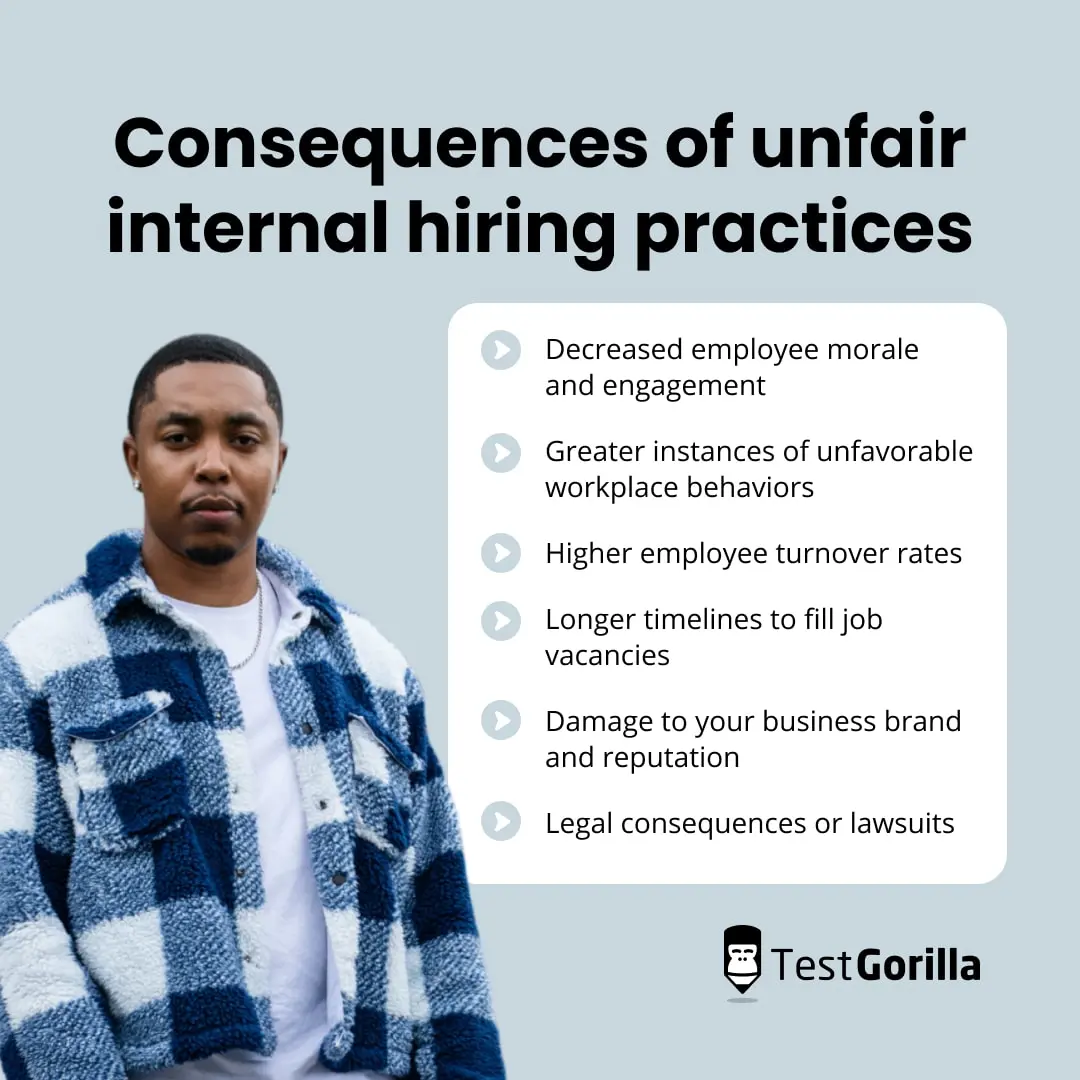Internal hires can increase employee satisfaction, fill job openings faster, and reduce your recruitment costs. However, many companies struggle to reap the benefits from internal hiring because they rely on unfair internal hiring practices. These practices negatively impact your employees and erode trust in your business.
Ensuring fairness in your internal hiring processes is not only the right thing to do; it’s a necessary step for protecting your business image and avoiding unnecessary turnover in your workforce.
In this post, we share common examples of unfair internal hiring practices and give you practical advice for avoiding them.
Table of contents
- What is internal hiring?
- What are unfair internal hiring practices?
- Unfair vs. discriminatory hiring practices: What's the difference?
- Common unfair internal hiring practice examples to learn from and avoid
- Consequences of unfair internal hiring practices
- How can your company ensure internal hiring practices are fair?
- Identify the best internal candidates fairly with TestGorilla’s skill assessments
What is internal hiring?
Internal hiring, sometimes called internal recruitment or promotion, is the practice of recruiting existing employees to fill job openings. Sometimes, internal hiring can occur in place of hiring candidates from outside the company. Other times, you might simply give preference to internal candidates while simultaneously considering external candidates.
Internal hiring can encourage career growth and development for existing staff while also promoting their commitment to your organization. Additionally, internal hiring can be a cost-effective and efficient way for you to fill key positions while harnessing the expertise and institutional knowledge of your current workforce.
Companies often use internal hiring to fill newly created positions, offer promotions, or transfer existing staff to new locations. Employee referral programs intersect with internal recruitment. While referred candidates are external, they come with a stamp of approval from your referring employee.
What are unfair internal hiring practices?
Unfair internal hiring practices are inconsistent or unclear recruitment methods, resulting in unequal or biased hiring decisions. These practices ultimately harm your internal employees and cause damage to your company's reputation, culture, and long-term success.
Unfair vs. discriminatory hiring practices: What's the difference?
You should avoid both unfair and discriminatory hiring practices because they’re both potentially damaging to your business. However, they’re not the same thing.
Unfair hiring practices stem from errors, negligence, or inconsistent behavior. These often result in unjust hiring decisions. Consider a company whose policy is to promote opportunities on an internal job board.
A hiring manager at that company who notifies only some internal candidates of a promotion opportunity is engaging in an unfair hiring practice because the practice is inconsistent with company policy.
Discriminatory hiring practices, on the other hand, stem explicitly from prejudice or bias. These practices seek to exclude or discriminate against individuals based on protected characteristics like age, gender, or race.
If the same hiring manager above notified only male candidates of the promotion opportunity because they wanted to exclude female candidates, they’d be engaging in a discriminatory hiring practice.
Discrimination in hiring is illegal under US employment laws and can result in significant legal liability for your business.
While not necessarily illegal, unfair hiring practices can erode your brand value and make it harder to retain top talent.
Common unfair internal hiring practice examples to learn from and avoid
Unfair internal hiring practices can be harder to spot than outright discrimination. Here are some common examples to avoid in your internal hiring process.
Personal feelings
Personal feelings or perceptions about existing employees can unfairly influence hiring managers' decisions, causing them to treat internal applicants inconsistently. Their admiration for an employee might lead them to overlook their lack of qualifications for a higher role, for example.
On the other hand, their past conflicts with employees might cause them to bypass deserving candidates for promotions or other opportunities. Be aware of these biases and ensure your company’s hiring decisions are based on objective evaluations rather than personal feelings.
Nepotism and unfair referral hiring
Favoring family members or close friends of the hiring manager or prominent employees without considering their qualifications or fit for the role can undermine trust in your organization. Avoid this by adopting a clear policy against nepotism and ensuring that all candidates undergo the same hiring evaluation process based on objective criteria, even when prominent employees refer them.
Lower pay for internal hires
Offering internal candidates lower compensation than you would provide external hires can ultimately lead to an erosion of trust and loss of talent if the internal hires realize the discrepancy between their pay and the pay the position commands.
It can also lead to discrimination claims if the pay discrepancy appears tied to a personal characteristic like race or gender. Avoid this by offering all hires fair compensation that reflects the role's market value.
Inadequate internal job postings
Failing to post job opportunities in ways that offer visibility to existing employees can prevent qualified internal candidates from applying. Ensure that job postings are widely accessible to internal candidates, and use internal communication channels to broaden your reach.
Lack of transparency
Failing to communicate the criteria for the role and the expected hiring process can lead to confusion and distrust from your internal applicants. Be sure to clearly outline steps, criteria, and timelines to all internal or external candidates. Provide regular updates to keep candidates informed and engaged in the process.
Resume-focused hiring
Whether internal or external, a candidate's resume should never be the only focus of your hiring process. Over-relying on a candidate’s resume can limit your ability to assess their skills, particularly for internal candidates wanting to move into a different business area. Use skills-based hiring to make the process fair.
Inconsistent evaluation
Using two sets of criteria to evaluate internal versus external candidates can lead to perceptions of bias and unfairness. Internal candidates may perceive these differences as intended to give preference to external candidates. You should standardize the candidate evaluation process to evaluate all applicants on the same clear and consistent criteria to ensure you are hiring the best candidate for the role, whether from internal or external talent. Should you wish to give preference to internal candidates, evaluate them first before heading to the external market.
Prioritizing external candidates
When hiring managers default to external hires without providing valid reasons, they can hinder employee development and loyalty since existing employees will believe that the company will consider only external hires for specific roles.
To avoid this outcome, you should communicate your rationale for hiring externally or seriously consider internal candidates when they meet the objective criteria for the role.
Consequences of unfair internal hiring practices
Decreased employee morale and engagement
Suppose an internal candidate has consistently demonstrated exceptional performance in their current role and is well-qualified for a higher-level position. However, the company hired an external candidate with less experience instead.
The internal candidate and their colleagues may feel demotivated and undervalued, leading to decreased morale and disengagement.
Greater instances of unfavorable workplace behaviors
Employees who believe promotions are based on favoritism rather than merit may feel resentment and start engaging in gossip or other workplace bullying behaviors. Such behaviors can create a toxic work environment, negatively affecting team dynamics and collaboration.
Higher employee turnover rates
When a company consistently chooses external candidates over qualified internal candidates, employees who see limited prospects for advancement can grow frustrated. Over time, many of these talented employees may resign and seek employment with organizations offering fairer career opportunities.
Longer timelines to fill job vacancies
Employees who believe internal hiring practices are unfair may hesitate to express interest in internal job vacancies. This reluctance prevents companies from quiet hiring and results in longer job vacancy periods. This in turn leads to increased workloads for existing staff and disruptions to business operations while jobs remain unfilled.
Damage to your business brand and reputation
Word of unfair practices can spread quickly through employee networks, tarnishing your company's image and deterring top talent from applying. This can also damage your diversity and inclusion efforts since candidates from underrepresented groups who believe your hiring decisions are biased may choose not to apply.
Legal consequences or lawsuits
An internal candidate who believes they were unfairly passed over for a promotion due to discriminatory practices might file a discrimination lawsuit against your company, resulting in costly and damaging legal battles.
How can your company ensure internal hiring practices are fair?
Ensuring fairness in your company’s internal hiring practices is the ethically responsible path forward and avoids negative consequences for your business. In addition to identifying and correcting any unfair internal hiring practices, take these steps to protect the integrity of your internal hiring practices:
Develop transparent policies
Create clear hiring policies and procedures. Differentiate between your processes for internal and external candidates. For example, internal candidates might assume they aren’t considered as seriously as external candidates if they don’t go through the same number of interviews unless you provide fair and transparent reasons for this.
Your policies should ensure that you base hiring decisions on objective criteria and that the process is transparent and understandable.
Implement training
Provide training to hiring managers and decision-makers on hiring policies and company expectations. Training is an excellent way to educate your hiring teams to identify and avoid unconscious bias in hiring.
Conducting training will help your hiring team make more objective hiring decisions. You can also measure and reinforce training with testing to check if your hiring team members are willing and able to comply with ethical obligations.
Standardize evaluation practices
Every job posting should have clear criteria for identifying an ideal candidate. Reflect on the job’s responsibilities and evaluate whether each qualification is necessary to perform the job successfully. This will help avoid unnecessarily excluding candidates who could perform well.
Once you’ve identified the qualifications necessary to perform the job, develop standardized evaluation processes that you can apply to all candidates.
Pre-employment tests are excellent for evaluating candidates fairly and objectively based on your outlined qualifications.
Regularly review and adjust
Periodically assess your methods and ensure you follow best hiring practices, including soliciting employee and candidate feedback. This will help you identify any areas where hiring practices aren’t running smoothly or have given an impression of unfairness.
Use the feedback you receive and your review findings to make adjustments as needed to improve fairness in the hiring process.
Identify the best internal candidates fairly with TestGorilla’s skill assessments
Internal hiring can improve your business in many ways, but poor communication and inconsistent processes can undermine the benefits and leave you with distrustful employees. Avoid the consequences of an unfair hiring process by developing and clearly communicating fair hiring practices.
Whether you’re opening a job opportunity to internal candidates alone or to both internal and external applicants, TestGorilla’s assessments can help you find the right hire quickly and fairly. Unlike resumes, skills tests enable you to objectively measure each candidate’s ability to tackle the new role. This helps build your employees’ trust in the fairness of your hiring practices.
Hiring managers can also combine job-specific skills tests with personality tests that provide a fuller picture of what each candidate would bring to the role. Such multi-measure assessments give your hiring team a clear and objective look at every candidate and provide a fair basis for hiring decisions.
Explore TestGorilla’s full test library to find the best assessments for every hire in your business.
Related posts
Hire the best candidates with TestGorilla
Create pre-employment assessments in minutes to screen candidates, save time, and hire the best talent.
Latest posts
The best advice in pre-employment testing, in your inbox.
No spam. Unsubscribe at any time.

Hire the best. No bias. No stress.
Our screening tests identify the best candidates and make your hiring decisions faster, easier, and bias-free.
Free resources
This checklist covers key features you should look for when choosing a skills testing platform
This resource will help you develop an onboarding checklist for new hires.
How to assess your candidates' attention to detail.
Learn how to get human resources certified through HRCI or SHRM.
Learn how you can improve the level of talent at your company.
Learn how CapitalT reduced hiring bias with online skills assessments.
Learn how to make the resume process more efficient and more effective.
Improve your hiring strategy with these 7 critical recruitment metrics.
Learn how Sukhi decreased time spent reviewing resumes by 83%!
Hire more efficiently with these hacks that 99% of recruiters aren't using.
Make a business case for diversity and inclusion initiatives with this data.


















